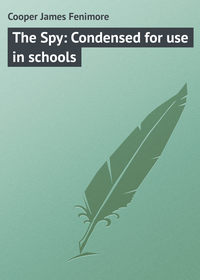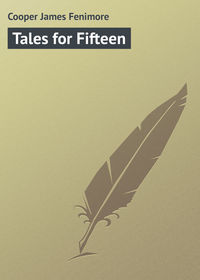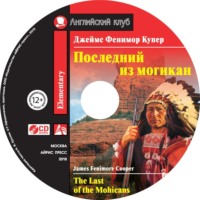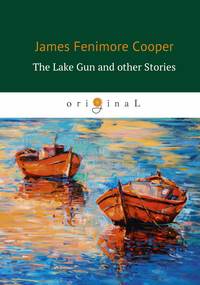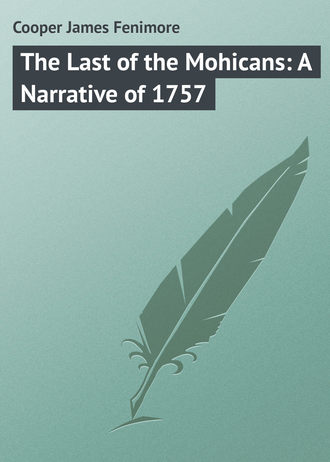 полная версия
полная версияThe Last of the Mohicans: A Narrative of 1757
The savage spurned the worthless rags, and perceiving that the shawl had already become a prize to another, his bantering but sullen smile changing to a gleam of ferocity, he dashed the head of the infant against a rock, and cast its quivering remains to her very feet. For an instant, the mother stood, like a statue of despair, looking wildly down at the unseemly object, which had so lately nestled in her bosom and smiled in her face; and then she raised her eyes and countenance towards heaven, as if calling on God to curse the perpetrator of the foul deed. She was spared the sin of such a prayer; for, maddened at his disappointment, and excited at the sight of blood, the Huron mercifully drove his tomahawk into her own brain. The mother sank under the blow, and fell, grasping at her child, in death, with the same engrossing love that had caused her to cherish it when living.
At that dangerous moment Magua placed his hands to his mouth, and raised the fatal and appalling whoop. The scattered Indians started at the well-known cry, as coursers bound at the signal to quit the goal; and, directly, there arose such a yell along the plain, and through the arches of the wood, as seldom burst from human lips before. They who heard it listened with a curdling horror at the heart, little inferior to that dread which may be expected to attend the blasts of the final summons.
More than two thousand raving savages broke from the forest at the signal, and threw themselves across the fatal plain with instinctive alacrity. We shall not dwell on the revolting horrors that succeeded. Death was everywhere, and in his most terrific and disgusting aspects. Resistance only served to inflame the murderers, who inflicted their furious blows long after their victims were beyond the power of their resentment. The flow of blood might be likened to the outbreaking of a torrent; and, as the natives became heated and maddened by the sight, many among them even kneeled to the earth, and drank freely, exultingly, hellishly, of the crimson tide.
The trained bodies of the troops threw themselves quickly into solid masses, endeavoring to awe their assailants by the imposing appearance of a military front. The experiment in some measure succeeded, though far too many suffered their unloaded muskets to be torn from their hands, in the vain hope of appeasing the savages.
In such a scene none had leisure to note the fleeting moments. It might have been ten minutes (it seemed an age), that the sisters had stood riveted to one spot, horror-stricken, and nearly helpless. When the first blow was struck, their screaming companions had pressed upon them in a body, rendering flight impossible; and now that fear or death had scattered most, if not all, from around them, they saw no avenue open, but such as conducted to the tomahawks of their foes. On every side arose shrieks, groans, exhortations, and curses. At this moment Alice caught a glimpse of the vast form of her father, moving rapidly across the plain, in the direction of the French army. He was, in truth, proceeding to Montcalm, fearless of every danger, to claim the tardy escort for which he had before conditioned. Fifty glittering axes and barbed spears were offered unheeded at his life, but the savages respected his rank and calmness, even in their fury. The dangerous weapons were brushed aside by the still nervous arm of the veteran, or fell of themselves, after menacing an act that it would seem no one had courage to perform. Fortunately, the vindictive Magua was searching for his victim in the very band the veteran had just quitted.
"Father – father – we are here!" shrieked Alice, as he passed, at no great distance, without appearing to heed them. "Come to us, father, or we die!"
The cry was repeated, and in terms and tones that might have melted a heart of stone, but it was unanswered. Once, indeed, the old man appeared to catch the sounds, for he paused and listened; but Alice had dropped senseless on the earth, and Cora had sunk at her side, hovering in untiring tenderness over her lifeless form. Munro shook his head in disappointment, and proceeded, bent on the high duty of his station.
"Lady," said Gamut, who, helpless and useless as he was, had not yet dreamed of deserting his trust, "it is the jubilee of the devils, and this is not a meet place for Christians to tarry in. Let us up and fly."
"Go," said Cora, still gazing at her unconscious sister; "save thyself. To me thou canst not be of further use."
David comprehended the unyielding character of her resolution, by the simple but expressive gesture that accompanied her words. He gazed, for a moment, at the dusky forms that were acting their hellish rites on every side of him, and his tall person grew more erect, while his chest heaved, and every feature swelled, and seemed to speak with the power of the feelings by which he was governed.
"If the Jewish boy might tame the evil spirit of Saul by the sound of his harp, and the words of sacred song, it may not be amiss," he said, "to try the potency of music here."
Then raising his voice to its highest tones, he poured out a strain so powerful as to be heard even amid the din of that bloody field. More than one savage rushed towards them, thinking to rifle the unprotected sisters of their attire, and bear away their scalps; but when they found this strange and unmoved figure riveted to his post, they paused to listen. Astonishment soon changed to admiration, and they passed on to other and less courageous victims, openly expressing their satisfaction at the firmness with which the white warrior sang his death song. Encouraged and deluded by his success, David exerted all his powers to extend what he believed so holy an influence. The unwonted sounds caught the ears of a distant savage, who flew raging from group to group, like one who, scorning to touch the vulgar herd, hunted for some victim more worthy of his renown. It was Magua, who uttered a yell of pleasure when he beheld his ancient prisoners again at his mercy.
"Come," he said, laying his soiled hands on the dress of Cora, "the wigwam of the Huron is still open. Is it not better than this place?"
"Away!" cried Cora, veiling her eyes from his revolting aspect.
The Indian laughed tauntingly, as he held up his reeking hand, and answered, – "It is red, but it comes from white veins!"
"Monster! there is blood, oceans of blood, upon thy soul; thy spirit has moved this scene."
"Magua is a great chief!" returned the exulting savage; "will the dark hair go to his tribe?"
"Never! strike, if thou wilt, and complete thy revenge."
He hesitated a moment; and then catching the light and senseless form of Alice in his arms, the subtle Indian moved swiftly across the plain towards the woods.
"Hold!" shrieked Cora, following wildly on his footsteps; "release the child! wretch! what is't you do?"
But Magua was deaf to her voice; or rather he knew his power, and was determined to maintain it.
"Stay – lady – stay," called Gamut, after the unconscious Cora. "The holy charm is beginning to be felt, and soon shalt thou see this horrid tumult stilled."
Perceiving that, in his turn, he was unheeded, the faithful David followed the distracted sister, raising his voice again in sacred song, and sweeping the air to the measure, with his long arm, in diligent accompaniment. In this manner they traversed the plain, through the flying, the wounded, and the dead. The fierce Huron was, at any time, sufficient for himself and the victim that he bore; though Cora would have fallen, more than once, under the blows of her savage enemies, but for the extraordinary being who stalked in her rear, and who now appeared to the astonished natives gifted with the protecting spirit of madness.
Magua, who knew how to avoid the more pressing dangers, and also to elude pursuit, entered the woods through a low ravine, where he quickly found the Narragansetts, which the travellers had abandoned so shortly before, awaiting his appearance, in custody of a savage as fierce and as malign in his expression as himself. Laying Alice on one of the horses, he made a sign to Cora to mount the other.
Notwithstanding the horror excited by the presence of her captor, there was a present relief in escaping from the bloody scene enacting on the plain, to which Cora could not be altogether insensible. She took her seat, and held forth her arms for her sister, with an air of entreaty and love that even the Huron could not deny. Placing Alice, then, on the same animal with Cora, he seized the bridle, and commenced his route by plunging deeper into the forest. David, perceiving that he was left alone, utterly disregarded, as a subject too worthless even to destroy, threw his long limb across the saddle of the beast they had deserted, and made such progress in the pursuit as the difficulties of the path permitted.
They soon began to ascend, but as the motion had a tendency to revive the dormant faculties of her sister, the attention of Cora was too much divided between the tenderest solicitude in her behalf, and in listening to the cries which were still too audible on the plain, to note the direction in which they journeyed. When, however, they gained the flattened surface of the mountain-top, and approached the eastern precipice, she recognized the spot to which she had once before been led under the more friendly auspices of the scout. Here Magua suffered them to dismount; and, notwithstanding their own captivity, the curiosity which seems inseparable from horror, induced them to gaze at the sickening sight below.
The cruel work was still unchecked. On every side the captured were flying before their relentless persecutors, while the armed columns of the Christian king stood fast in an apathy which has never been explained, and which has left an unmovable blot on the otherwise fair escutcheon of their leader. Nor was the sword of death stayed until cupidity got the mastery of revenge. Then, indeed, the shrieks of the wounded and the yells of their murderers grew less frequent, until, finally, the cries of horror were lost to their ear, or were drowned in the loud, long, and piercing whoops of the triumphant savages.
CHAPTER XVIII
"Why, anything:An honorable murderer, if you will;For naught I did in hate, but all in honor."Othello.The bloody and inhuman scene rather incidentally mentioned than described in the preceding chapter, is conspicuous in the pages of colonial history, by the merited title of "The Massacre of William Henry." It so far deepened the stain which a previous and very similar event had left upon the reputation of the French commander, that it was not entirely erased by his early and glorious death. It is now becoming obscured by time; and thousands, who know that Montcalm died like a hero on the plains of Abraham, have yet to learn how much he was deficient in that moral courage without which no man can be truly great. Pages might be written to prove, from this illustrious example, the defects of human excellence; to show how easy it is for generous sentiments, high courtesy, and chivalrous courage, to lose their influence beneath the chilling blight of selfishness, and to exhibit to the world a man who was great in all the minor attributes of character, but who was found wanting when it became necessary to prove how much principle is superior to policy. But the task would exceed our prerogatives; and, as history, like love, is so apt to surround her heroes with an atmosphere of imaginary brightness, it is probable that Louis de Saint Véran will be viewed by posterity only as the gallant defender of his country, while his cruel apathy on the shores of the Oswego and of the Horican will be forgotten. Deeply regretting this weakness on the part of a sister muse, we shall at once retire from her sacred precincts, within the proper limits of our own humble vocation.
The third day from the capture of the fort was drawing to a close, but the business of the narrative must still detain the reader on the shores of the "holy lake." When last seen, the environs of the works were filled with violence and uproar. They were now possessed by stillness and death. The blood-stained conquerors had departed; and their camp, which had so lately rung with the merry rejoicings of a victorious army, lay a silent and deserted city of huts. The fortress was a smouldering ruin; charred rafters, fragments of exploded artillery, and rent mason-work, covering its earthen mounds in confused disorder.
A frightful change had also occurred in the season. The sun had hid its warmth behind an impenetrable mass of vapor, and hundreds of human forms, which had blackened beneath the fierce heats of August, were stiffening in their deformity, before the blasts of a premature November. The curling and spotless mists, which had been seen sailing above the hills towards the north, were now returning in an interminable dusky sheet, that was urged along by the fury of a tempest. The crowded mirror of the Horican was gone; and, in its place, the green and angry waters lashed the shores, as if indignantly casting back its impurities to the polluted strand. Still the clear fountain retained a portion of its charmed influence, but it reflected only the sombre gloom that fell from the impending heavens. That humid and congenial atmosphere which commonly adorned the view, veiling its harshness, and softening its asperities, had disappeared, and the northern air poured across the waste of water so harsh and unmingled, that nothing was left to be conjectured by the eye, or fashioned by the fancy.
The fiercer element had cropped the verdure of the plain, which looked as though it were scathed by the consuming lightning. But, here and there, a dark green tuft rose in the midst of the desolation; the earliest fruits of a soil that had been fattened with human blood. The whole landscape, which, seen by a favoring light, and in a genial temperature, had been found so lovely, appeared now like some pictured allegory of life, in which objects were arrayed in their harshest but truest colors, and without the relief of any shadowing.
The solitary and arid blades of grass arose from the passing gusts fearfully perceptible; the bold and rocky mountains were too distinct in their barrenness, and the eye even sought relief, in vain, by attempting to pierce the illimitable void of heaven, which was shut to its gaze by the dusky sheet of ragged and driving vapor.
The wind blew unequally; sometimes sweeping heavily along the ground, seeming to whisper its moanings in the cold ears of the dead, then rising in a shrill and mournful whistling, it entered the forest with a rush that filled the air with the leaves and branches it scattered in its path. Amid the unnatural shower, a few hungry ravens struggled with the gale; but no sooner was the green ocean of woods, which stretched beneath them, passed, than they gladly stopped, at random, to their hideous banquet.
In short, it was the scene of wildness and desolation; and it appeared as if all who had profanely entered it had been stricken, at a blow, by the relentless arm of death. But the prohibition had ceased; and for the first time since the perpetrators of those foul deeds which had assisted to disfigure the scene were gone, living human beings had now presumed to approach the place.
About an hour before the setting of the sun, on the day already mentioned, the forms of five men might have been seen issuing from the narrow vista of trees, where the path to the Hudson entered the forest, and advancing in the direction of the ruined works. At first their progress was slow and guarded, as though they entered with reluctance amid the horrors of the spot, or dreaded the renewal of its frightful incidents. A light figure preceded the rest of the party, with the caution and activity of a native; ascending every hillock to reconnoitre, and indicating, by gestures, to his companions, the route he deemed it most prudent to pursue. Nor were those in the rear wanting in every caution and foresight known to forest warfare. One among them, he also was an Indian, moved a little on one flank, and watched the margin of the woods, with eyes long accustomed to read the smallest sign of danger. The remaining three were white, though clad in vestments adapted, both in quality and color, to their present hazardous pursuit, – that of hanging on the skirts of a retiring army in the wilderness.
The effects produced by the appalling sights that constantly arose in their path to the lake shore, were as different as the characters of the respective individuals who composed the party. The youth in front threw serious but furtive glances at the mangled victims, as he stepped lightly across the plain, afraid to exhibit his feelings, and yet too inexperienced to quell entirely their sudden and powerful influence. His red associate, however, was superior to such a weakness. He passed the groups of dead with a steadiness of purpose, and an eye so calm, that nothing but long and inveterate practice could enable him to maintain. The sensations produced in the minds of even the white men were different, though uniformly sorrowful. One, whose gray locks and furrowed lineaments, blending with a martial air and tread, betrayed, in spite of the disguise of a woodsman's dress, a man long experienced in scenes of war, was not ashamed to groan aloud, whenever a spectacle of more than usual horror came under his view. The young man at his elbow shuddered, but seemed to suppress his feelings in tenderness to his companion. Of them all, the straggler who brought up the rear appeared alone to betray his real thoughts, without fear of observation or dread of consequences. He gazed at the most appalling sight with eyes and muscles that knew not how to waver, but with execrations so bitter and deep as to denote how much he denounced the crime of his enemies.
The reader will perceive at once, in these respective characters, the Mohicans, and their white friend, the scout; together with Munro and Heyward. It was, in truth, the father in quest of his children, attended by the youth who felt so deep a stake in their happiness, and those brave and trusty foresters, who had already proved their skill and fidelity through the trying scenes related.
When Uncas, who moved in front, had reached the centre of the plain, he raised a cry that drew his companions in a body to the spot. The young warrior had halted over a group of females who lay in a cluster, a confused mass of dead. Notwithstanding the revolting horror of the exhibition, Munro and Heyward flew towards the festering heap, endeavoring, with a love that no unseemliness could extinguish, to discover whether any vestiges of those they sought were to be seen among the tattered and many-colored garments. The father and lover found instant relief in the search; though each was condemned again to experience the misery of an uncertainty that was hardly less insupportable than the most revolting truth. They were standing, silent and thoughtful, around the melancholy pile, when the scout approached. Eying the sad spectacle with an angry countenance, the sturdy woodsman, for the first time since his entering the plain, spoke intelligibly and aloud: —
"I have been on many a shocking field, and have followed a trail of blood for many miles," he said, "but never have I found the hand of the devil so plain as it is here to be seen! Revenge is an Indian feeling, and all who know me know that there is no cross in my veins; but this much will I say – here, in the face of heaven, and with the power of the Lord so manifest in this howling wilderness, – that should these Frenchers ever trust themselves again within the range of a ragged bullet, there is one rifle shall play its part, so long as flint will fire or powder burn! I leave the tomahawk and knife to such as have a natural gift to use them. What say you, Chingachgook," he added in Delaware; "shall the Hurons boast of this to their women when the deep snows come?"
A gleam of resentment flashed across the dark lineaments of the Mohican chief: he loosened his knife in its sheath; and then turning calmly from the sight, his countenance settled into a repose as deep as if he never knew the instigation of passion.
"Montcalm! Montcalm!" continued the deeply resentful and less self-restrained scout; "they say a time must come, when all the deeds done in the flesh will be seen at a single look; and that by eyes cleared from mortal infirmities. Woe betide the wretch who is born to behold this plain, with the judgment hanging about his soul! Ha – as I am a man of white blood, yonder lies a redskin, without the hair of his head where nature rooted it! Look to him, Delaware; it may be one of your missing people; and he should have burial like a stout warrior. I see it in your eye, Sagamore: a Huron pays for this, afore the fall winds have blown away the scent of the blood!"
Chingachgook approached the mutilated form, and turning it over, he found the distinguishing marks of one of those six allied tribes, or nations, as they were called, who, while they fought in the English ranks, were so deadly hostile to his own people. Spurning the loathsome object with his foot, he turned from it with the same indifference he would have quitted a brute carcass. The scout comprehended the action, and very deliberately pursued his own way, continuing, however, his denunciations against the French commander in the same resentful strain.
"Nothing but vast wisdom and unlimited power should dare to sweep off men in multitudes," he added; "for it is only the one that can know the necessity of the judgment; and what is there, short of the other, that can replace the creatures of the Lord? I hold it a sin to kill the second buck afore the first is eaten, unless a march in the front, or an ambushment, be contemplated. It is a different matter with a few warriors in open and rugged fight, for 'tis their gift to die with the rifle or the tomahawk in hand; according as their natures may happen to be, white or red. Uncas, come this way, lad, and let the ravens settle upon the Mingo. I know, from often seeing it, that they have a craving for the flesh of an Oneida; and it is as well to let the bird follow the gift of its natural appetite."
"Hugh!" exclaimed the young Mohican, rising on the extremities of his feet, and gazing intently in his front, frightening the raven to some other prey, by the sound and the action.
"What is it, boy?" whispered the scout, lowering his tall form into a crouching attitude, like a panther about to take his leap; "God send it be a tardy Frencher, skulking for plunder. I do believe 'Killdeer' would take an oncommon range to-day!"
Uncas, without making any reply, bounded away from the spot, and in the next instant he was seen tearing from a bush, and waving in triumph a fragment of the green riding-veil of Cora. The movement, the exhibition, and the cry, which again burst from the lips of the young Mohican, instantly drew the whole party about him.
"My child!" said Munro, speaking quick and wildly "give me my child!"
"Uncas will try," was the short and touching answer.
The simple but meaning assurance was lost on the father, who seized the piece of gauze, and crushed it in his hand, while his eyes roamed fearfully among the bushes, as if he equally dreaded and hoped for the secrets they might reveal.
"Here are no dead," said Heyward; "the storm seems not to have passed this way."
"That's manifest; and clearer than the heavens above our heads," returned the undisturbed scout; "but either she, or they that have robbed her, have passed the bush; for I remember the rag she wore to hide a face that all did love to look upon. Uncas, you are right; the dark-hair has been here, and she has fled like a frightened fawn, to the wood; none who could fly would remain to be murdered. Let us search for the marks she left; for to Indian eyes, I sometimes think even a humming-bird leaves his trail in the air."
The young Mohican darted away at the suggestion, and the scout had hardly done speaking, before the former raised a cry of success from the margin of the forest. On reaching the spot, the anxious party perceived another portion of the veil fluttering on the lower branch of a beech.
"Softly, softly," said the scout, extending his long rifle in front of the eager Heyward; "we now know our work, but the beauty of the trail must not be deformed. A step too soon may give us hours of trouble. We have them, though; that much is beyond denial."







